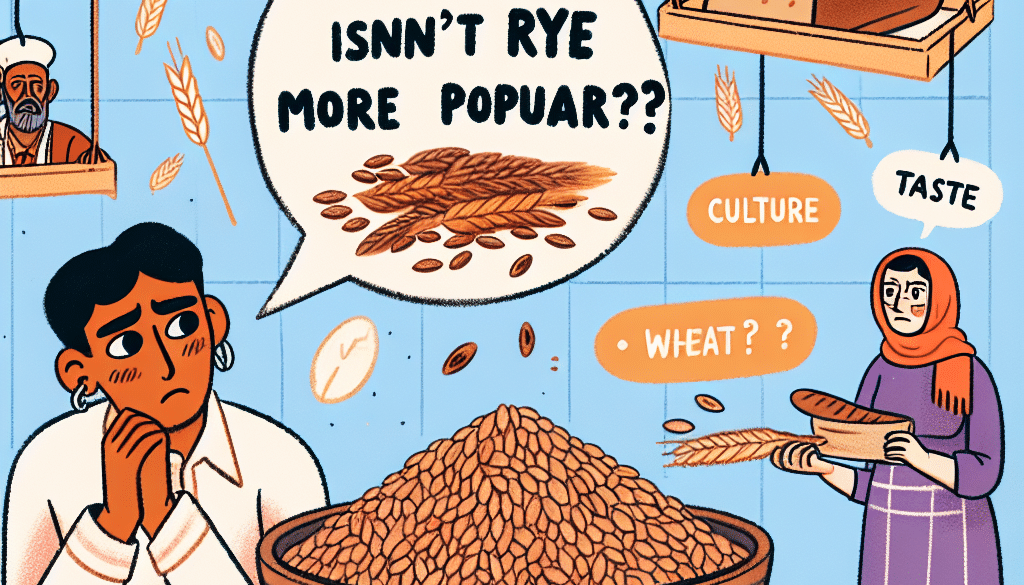Why Isn T Rye More Popular?
-
Table of Contents
- Rye’s Underappreciated Role in Our Diets: A Closer Look
- The History and Decline of Rye
- Nutritional Profile: The Overlooked Benefits of Rye
- Culinary Uses: Rye’s Limited Appeal
- Market Availability and Consumer Awareness
- Case Studies: Rye’s Popularity in Certain Cultures
- Challenges in Rye Farming and Production
- Conclusion: The Untapped Potential of Rye
- Discover ETprotein’s High-Quality Protein Products
Rye’s Underappreciated Role in Our Diets: A Closer Look
Rye is a grain that has been cultivated for thousands of years, known for its hardiness and ability to thrive in poor soil conditions where other grains might fail. Despite its rich history and nutritional benefits, rye often takes a backseat to more popular grains like wheat and rice in many parts of the world. This article delves into the reasons behind rye’s relative obscurity and explores why it deserves a more prominent place on our plates.
The History and Decline of Rye
Rye has a storied past, with evidence of its cultivation dating back to the Bronze Age. It became a staple in Europe, particularly in the colder northern regions, where it was valued for its resilience to harsh weather. However, the rise of wheat’s popularity, coupled with agricultural advancements, led to a decline in rye cultivation. The preference for wheat’s milder flavor and more versatile flour contributed to rye becoming less common in everyday diets.
Nutritional Profile: The Overlooked Benefits of Rye
Rye is a nutrient-dense grain that offers a range of health benefits. It is high in fiber, which aids in digestion and can help prevent chronic diseases such as diabetes and heart disease. Rye also contains important vitamins and minerals, including magnesium, phosphorus, and B vitamins. Despite these advantages, rye’s stronger flavor and denser texture compared to wheat have made it less appealing to some consumers.
- High in soluble and insoluble fiber
- Rich in essential nutrients
- Low glycemic index for better blood sugar control
Culinary Uses: Rye’s Limited Appeal
Rye flour is often associated with dense, dark bread like pumpernickel, which has a distinct taste that may not be universally appealing. This has limited rye’s use in mainstream baking and cooking, where more neutral-tasting grains are preferred. Additionally, rye flour lacks the gluten content necessary for creating light, airy bread, which has further restricted its culinary applications.
Market Availability and Consumer Awareness
The availability of rye products in supermarkets is often limited compared to wheat-based items. This lack of presence on store shelves reduces consumer exposure and familiarity with rye, leading to a cycle of low demand and limited supply. Furthermore, there is a general lack of awareness about the benefits of rye and how to incorporate it into a varied diet, which contributes to its underutilization.
Case Studies: Rye’s Popularity in Certain Cultures
While rye may not be a staple in many parts of the world, it still holds a place of importance in some cultures. For example, in Scandinavian countries and parts of Eastern Europe, rye bread is a traditional food that remains popular. These regions have maintained their rye consumption due to cultural preferences and a historical reliance on the grain’s hardiness.
Challenges in Rye Farming and Production
Rye farming faces several challenges that affect its popularity. It is often seen as a lower-yield crop compared to wheat, making it less economically attractive for farmers. Additionally, rye can be susceptible to ergot, a fungal disease that can contaminate the grain and make it unsafe for consumption. These factors have discouraged investment in rye agriculture and research.
Conclusion: The Untapped Potential of Rye
Rye’s decline in popularity is a multifaceted issue involving taste preferences, market dynamics, and agricultural challenges. However, its nutritional benefits and cultural significance suggest that there is untapped potential for this hearty grain. By increasing consumer awareness, expanding culinary applications, and addressing farming obstacles, rye could enjoy a resurgence in our diets.
Discover ETprotein’s High-Quality Protein Products
For those looking to diversify their protein sources, ETprotein offers a range of organic bulk vegan proteins that are non-GMO and allergen-free. Their products, including organic rice protein and pea protein, provide excellent alternatives for individuals seeking plant-based nutrition options. ETprotein’s commitment to quality ensures that consumers receive the best possible products to meet their dietary needs.
About ETprotein:
ETprotein, a reputable protein and L-(+)-Ergothioneine (EGT) Chinese factory manufacturer and supplier, is renowned for producing, stocking, exporting, and delivering the highest quality organic bulk vegan proteins and L-(+)-Ergothioneine. They include Organic rice protein, clear rice protein, pea protein, clear pea protein, watermelon seed protein, pumpkin seed protein, sunflower seed protein, mung bean protein, peanut protein, and L-(+)-Ergothioneine EGT Pharmaceutical grade, L-(+)-Ergothioneine EGT food grade, L-(+)-Ergothioneine EGT cosmetic grade, L-(+)-Ergothioneine EGT reference grade and L-(+)-Ergothioneine EGT standard. Their offerings, characterized by a neutral taste, non-GMO, allergen-free attributes, with L-(+)-Ergothioneine purity over 98%, 99%, cater to a diverse range of industries. They serve nutraceutical, pharmaceutical, cosmeceutical, veterinary, as well as food and beverage finished product distributors, traders, and manufacturers across Europe, USA, Canada, Australia, Thailand, Japan, Korea, Brazil, and Chile, among others.
ETprotein specialization includes exporting and delivering tailor-made protein powder and finished nutritional supplements. Their extensive product range covers sectors like Food and Beverage, Sports Nutrition, Weight Management, Dietary Supplements, Health and Wellness Products, and Infant Formula, ensuring comprehensive solutions to meet all your protein needs.
As a trusted company by leading global food and beverage brands and Fortune 500 companies, ETprotein reinforces China’s reputation in the global arena. For more information or to sample their products, please contact them and email sales(at)ETprotein.com today.












